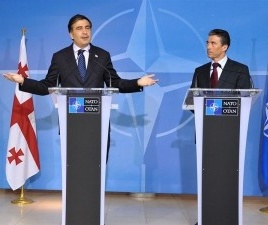
TBILISI, DFWatch – The Georgian president calls on the international community to send ultra long-term election observers to his country before the parliamentary elections in October.
Rights groups and part of the opposition have been appealing to the world to send extra observers, fearing that the regime will misuse its resources to prevent it from losing its grip on power.
While meeting NATO’s Secretary General Tuesday, President Mikheil Saakashvili agreed to their demand.
During a joint press conference with Anders Fogh Rasmussen at NATO headquarters in Brussels, Saakashvili reaffirmed that he too wants extra observers.
“To do polling of public opinion for all this period, to monitor Georgian media coverage, to monitor party financing mechanism in Georgia order to ensure that not just the day of elections, but the whole process is transparent, predictable from points of view of observing standards and we exclude any kinds of surprises or any kind of biased and not such well-wishing pressure on the whole process from outside or from this active elements from any side.”
Saakashvili made a similar statement Saturday during a meeting with a group of parliamentarians within the EU’s Eastern Partnership project.
The main topic during the press conference in Brussels Tuesday was how the issue of Georgia’s relationship to the alliance will be handled at the upcoming Chicago summit.
NATO made a commitment in spring 2008 to some day offer Georgia membership, but stopped short of offering the country a so-called membership action plan, which is a formal procedure towards becoming member. Progress towards including Georgia has been slow after the country’s war against Russia in August of 2008. Statements from NATO point to the need for further democratic reforms as one of the challenges. In December 2011, Georgia was among several countries NATO called ‘aspirant countries’, which Russia said was not advisable because it might inspire Saakashvili to new adventures.
Anders Fogh Rasmussen said at the press conference that a decision is not yet made about what format the talks regarding NATO partner countries will have at the Chicago summit, however a special partnership with Georgia will be reflected in three directions.
Saakashvili once more mentioned that Georgia wants closer cooperation with NATO. He added that 70 percent of Georgian citizens support Georgia’s NATO integration, while only nine percent are against. This shows that there is a strong motivation for reforms and changes, he said, without making clear where the numbers were taken from. In a referendum five years ago, 77 % voted for and 23 % voted against NATO membership.
“We are looking forward to Chicago, I think the framework we are getting now for Chicago looks more and more hopeful because it really underlines that Georgia has been moving forward,” the Georgian leader said.
Like President Barack Obama has done, NATO’s Secretary General also called Georgia a model country. Saakashvili says it’s very important for Georgia to underline progress that’s been achieved.
Among other issues mentioned, the NATO Secretary General called Georgia a special partner and remarked that the Georgia-NATO cooperation will be reflected at the Chicago summit in three directions.
“Firstly, reflect that Georgia is one of the major contributors to our operation in Afghanistan. Secondly, reflect that Georgia in general is a major contributor to the trans-Atlantic cooperation within the special NATO-Georgia Commission and thirdly that Georgia is also considered an aspirant country, a country that aspires to become a future member of the alliance,” Anders Fogh Rasmussen said after he met President Mikheil Saakashvili in Brussels.
The Georgian president spoke about the importance of Georgia’s participation in regional security.
“We cannot stay intact or neutral or just impartial when we are talking about these issues, when we have absolutely light interests in terms of the success of the alliance.” he said, adding that Georgia wants operation in Afghanistan to end well, to participate in building Afghanistan after the war, help in reforms and training and participate in the process of pulling back troops.
“We are willing to do all of that, and I think this will only enhance our ties with the Alliance because it’s also ultimately that’s what it’s also about for our people.”
This is a hard mission in Afghanistan, but this mission brings Georgia closer to the alliance and it responds to Georgian history; to become part of Western civilization, the president said.
“We know, and our people know, that despite the losses, what’s at stake there, what’s at stake for the international community, and what’s at stake for our region and what’s at stake for us and for our future.”
Anders Fogh Rasmussen once more expressed support for Georgian territorial integrity and added that NATO doesn’t recognize the elections conducted in Georgia’s breakaway Abkhazia and South Ossetia.
“The holding of these elections does not contribute to a peaceful and lasting settlement of the situation in Georgia,” he said.

